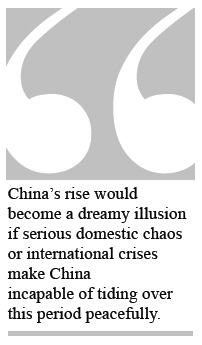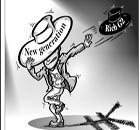Op-Ed Contributors
The pitfalls of blind pride
By Litai Xue (China Daily)
Updated: 2010-03-01 08:12
 |
Large Medium Small |
Economic incline may sink sense of crisis and hurt ability of government to adapt to future risks
United States President Barack Obama was all smiles and civil during his visit to China in November, more modest and gentle than any of his predecessors toward China. But his attitude toward the nation has taken an about-face into a tougher, more rigid stance, an issue that has recently been discussed at length. So what is the reason for this change within a short period of time?
Nothing truly monumental has prompted Washington to alter its strategy toward China. The change in Obama's stance most likely has resulted from four factors:
First, Washington believes that it is necessary to take preventive measures to stem the rise of China because its ascension could challenge the US' global dominance in the future; second, Obama is under attack in the US because of his failures to increase jobs and strengthen foreign policy. American domestic politics has pushed him to a tougher policy toward China.

Third, Obama, irritated by a drop in cooperation from China in foreign affairs over the past year, believes it's the right time to make China feel the consequences of its behavior. Fourth, Obama is frustrated over his personal efforts to deal with Chinese officials at the Copenhagen climate change conference. The latter two factors have played a direct and almost immediate role in the deterioration of Sino-American relations.
Beijing regards the first two decades of the new century as a "period of strategic opportunity". Enhancing its national strength depends on whether Beijing can avert a collision with the United States during this time, a key point that is vital to its "period of strategic opportunity". China's rise would become a dreamy illusion if serious domestic chaos or international crises make China incapable of tiding over this period peacefully.
Judging from historical lessons, a big GDP does not necessarily mean it's a big deal. An economy with real estate and commodities industries as its backbone, such as China's, is unable to swiftly transform to support the government in the event of managing a serious international military crisis.
In view of this, we can't overestimate the GDP's role in measuring a country's national strength. To re-evaluate the dictum of "lagging behind leaves one vulnerable to attacks", the lag refers to people's obsolete viewpoints and the leadership's strategic misjudgment. External forces will do their best to contain China's rise and severe tests including military struggles do exist in the near future. So what is the significance of talking about the possible ascension of China's economy, mainly supported by real estate and commodities, to the No 2 spot in the world?
In the past, Mao Zedong warned the people around him: "You can keep away from disasters if the enemy does exist and you can easily make mistakes if the enemy disappears". Situated in a complicated international environment, China will not benefit from the prevailing mood that it is ranked second in the world. If so, people will lack a sense of crisis and officials will lack appropriate countermeasures in response to swiftly changing international circumstances.
The major criteria for Western politicians to judge whether a country constitutes a threat is based on its national strength rather than its leadership's intent at a specific period of time. The motto that "a rising power means a rising threat" prevails in the West. The emergence of the "China threat" argument is based on this. Western politicians only worry about the consequences of the rise of China rather than the nation's approach to its rise.
Concerning the United States, Beijing has followed the policy of "preparing itself for both eventualities". In the future, China could most likely neutralize or even prevent the efforts of its foes to form an alliance against China and their aggressive actions to threaten China.
Historical results are usually bad if the public and the government are satisfied with blind pride. Fundamentally, the authorities will not benefit from such a feeling. Even in the short term, authorities will not benefit from this type of psychology because it would raise people's expectations of the highest authorities.
The author is a research associate at Center for International Security and Cooperation at Stanford University.
(China Daily 03/01/2010 page8)









